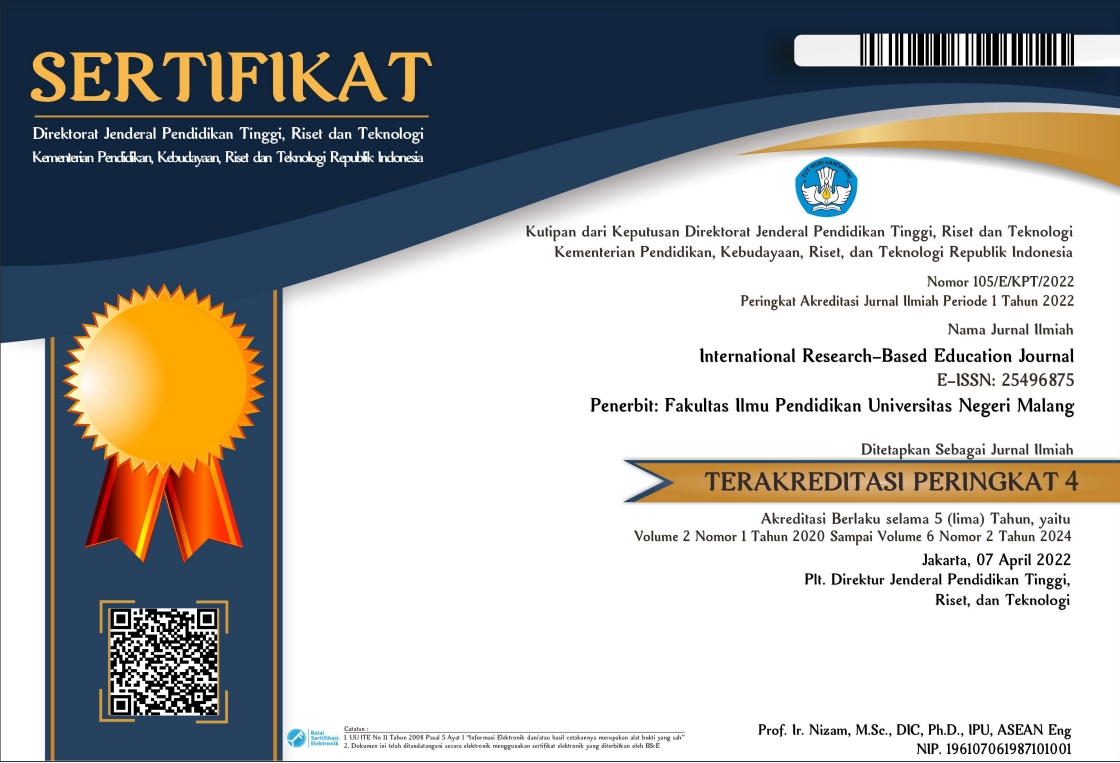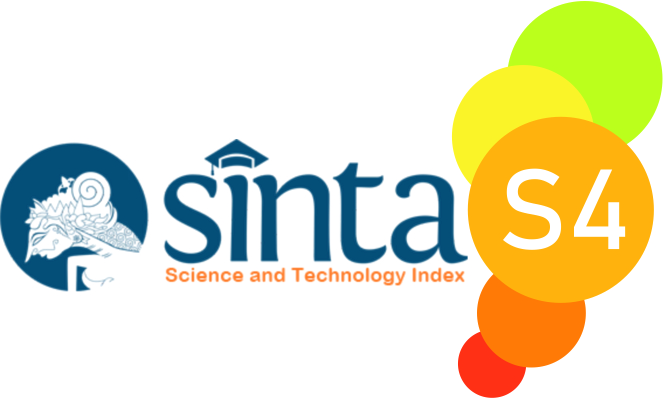Analysis of Student Learning Motivation on The Basis of Providing Guidance and Counseling Services to Higher Education
Abstract
Keywords
Full Text:
PDFReferences
Andriani, R., & Rasto, R. (2019). Motivasi belajar sebagai determinan hasil belajar siswa. Jurnal Pendidikan Manajemen Perkantoran, 4(1), 80. https://doi.org/10.17509/jpm.v4i1.14958
Brophy, J. (2004). Motivating students to learn. Routledge.
Creswell, J. W. (2010). Research design Pendekatan kualitatif. Kuantitatif, Dan Mixed.
Fadilla, H. D., Ardimen, A., Syafwar, F., & Hardi, E. (2022). Pengaruh bimbingan kelompok dengan pendekatan muhasabah terhadap motivasi berprestasi siswa. Ta’dibuna: Jurnal Pendidikan Islam, 11(2), 293–304.
Fitri, E., Ifdil, I., & Neviyarni, S. (2016). Efektivitas layanan informasi dengan menggunakan metode blended learning untuk meningkatkan motivasi belajar. Jurnal Psikologi Pendidikan Dan Konseling: Jurnal Kajian Psikologi Pendidikan Dan Bimbingan Konseling, 2(2), 84–92.
Gladding, S. T. (2012). Konseling profesi yang menyeluruh. In Indeks.
Gohari, P., Kamkar, A., Hosseinipour, S. J., & Zohoori, M. (2013). Relationship between rewards and employee performance: A mediating role of job satisfaction. Interdisciplinary Journal of Contemporary Research in Business, 5(3), 571–597.
H Hartini, E. A. (2021). ICT and Curiosity Learning Development (Literasi Baru Era Revolusi Industri 4.0 dan Masyarakat 5.0). (Cetakan Pe, pp. 1–180). LP2 IAIN Curup.
Kasih, F. (2019). Bimbingan dan Konseling di Perguruan Tinggi dalam Menjawab Tantangan Era Revolusi Industri 4.0. Konvensi Nasional Bimbingan Dan Konseling XXI, 15–22.
Kazdin, A. E., Major, B., Cozzarelli, C., Horowitz, M. J., Colyer, P. J., Link, A. A., Fuchs, L. S., Shapiro, E. S., Stoiber, K. C., Teo, T., Winter, D. G., Waldo, C. R., Coates, T. J., Wittig, M. A., Grove, W. M., Shaffer, H. J., Gough, H. G., Stewart, A. E., Sarigiani, P. A., … Simonton, D. K. (2000). Encyclopedia of Psychology : 8 Volume Set PUBLICATION DATE : March 2000 EDITION : Hardcover Main Topics with Contributors ’ Names Abortion Attachment Theory.
Keller, J. M. (2010). Motivational design research and development. The ARCS Model Approach, 297–323.
Kependidikan, D. J. P. M. P. dan T. (2007). Rambu -Rambu Penyelenggaraan BK pada Jenjang Pendidikan Formal.
Lee, J., & Martin, L. (2017). Investigating students’ perceptions of motivating factors of online class discussions. International Review of Research in Open and Distance Learning, 18(5), 148–172. https://doi.org/10.19173/irrodl.v18i5.2883
Lepper, M. R., Corpus, J. H., & Iyengar, S. S. (2005). Intrinsic and extrinsic motivational orientations in the classroom: Age differences and academic correlates. Journal of Educational Psychology, 97(2), 184.
Lin, Y.-M., Lin, G.-Y., & Laffey, J. M. (2008). Building a social and motivational framework for understanding satisfaction in online learning. Journal of Educational Computing Research, 38(1), 1–27.
Marolla, C. (2018). The Information and Communication Technology Revolution. In Information and Communication Technology for Sustainable Development (pp. 207–212). CRC Press.
Mele, A. R. (2005). “ Motivation and Agency”: Precis. Philosophical Studies: An International Journal for Philosophy in the Analytic Tradition, 123(3), 243–247.
Myrick, R. D. (2011). Developmental guidance and counseling : a practical approach.
Nurihsan, A. J. (2009). Bimbingan dan Konseling dalam berbagai latar kehidupan,. In Refika Aditama. Refika Aditama.
Permendikbud. (2014). Peraturan Menteri Pendidikan dan Kebudayaan Republik Indonesia Nomor 111 Tahun 2014 Tentang Bimbingan dan Konseling Pada Pendidikan Dasar dan Pendidikan Menengah. Jakarta: Kemendikbud RI, 1–45. https://jdih.kemdikbud.go.id/arsip/Permendikbud Nomor 111 Tahun 2014.pdf
Poore, M. (2015). Using social media in the classroom: A best practice guide. Sage.
Rahmad Hidayat, P., Ketua Ihsan Nul Hakim, Mp., Anggota Sagiman, M., Kurniawan, Mk. H., Jamaludin Rahmat, Mp., Arif Mustofa, M. M., Agita Miriani, Mp., Asri Karolia, Mp., & Eka Apriani, Mp. (2018). PANDUAN LAYANAN MAHASISWA IAIN CURUP TAHUN 2018 TIM PENYUSUN.
Republik Indonesia, P. (2012). Undang-Undang Republik Indonesia Nomor 12 Tahun 2012 Tentang Pendidikan Tinggi.
Samir Abou El-Seoud, M., Taj-Eddin, I. A. T. F., Seddiek, N., El-Khouly, M. M., & Nosseir, A. (2014). E-learning and students’ motivation: A research study on the effect of e-learning on higher education. International Journal of Emerging Technologies in Learning, 9(4), 20–26. https://doi.org/10.3991/ijet.v9i4.3465
Schunk, D. H., & Usher, E. L. (2012). Social cognitive theory and motivation. In The Oxford handbook of human motivation (Vol. 2).
Sunaryo, K. (2017). Ikhtisar, DARI BIMBINGAN DAN KONSELING PERKEMBANGAN KE KOMPREHENSIF.
Thorifah, Sri Bintang Anshar Alim, Budiyanto, E. D. (2020). Peran Konselor dalam Meningkatkan Motivasi Berprestasi Akademik. Indonesia Journal of Learning Education and Counseling, 3(1), 11–18.
Ugah, A. D., & Okpara, M. (2008). Motivation and Productivity in the Library. Library Philosophy and Practice, 195.
Utomo, P., Atmoko, A., & Hitipeuw, I. (2018). Peningkatan Motivasi Berprestasi Siswa SMA melalui Cognitive Behavior Counseling Teknik. Jurnal Pendidikan, 3(4), 416–423.
Wahyuni, E. N. (2020). Motivasi belajar. DIVA Perss.
WANG, J. H., & Guthrie, J. T. (2004). Modeling the effects of intrinsic motivation, extrinsic motivation, amount of reading, and past reading achievement on text comprehension between US and Chinese students. Reading Research Quarterly, 39(2), 162–186.
Zamani, Z. A. (2009). Computer Technology and Counselling. School of Psychology and Human Development. Faculty of Social Science and Humanities, IEEE.
DOI: http://dx.doi.org/10.17977/um043v5i1p%25p
Refbacks
- There are currently no refbacks.

This work is licensed under a Creative Commons Attribution-NonCommercial-ShareAlike 4.0 International License.










1.png)



